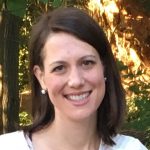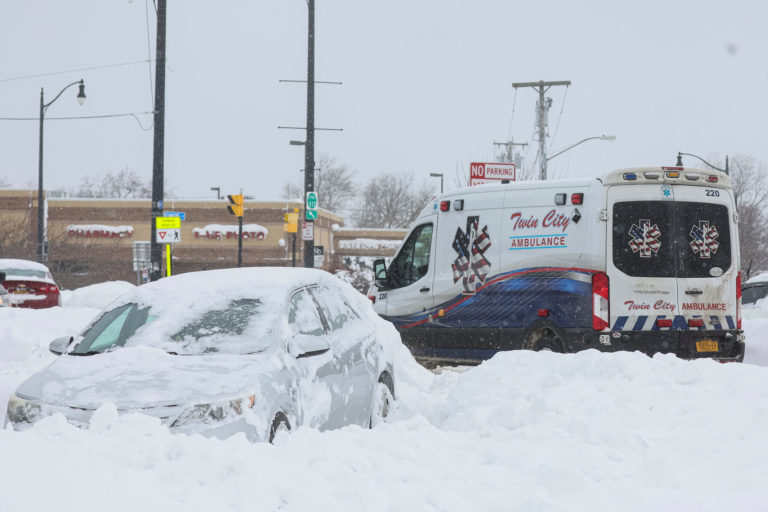It's not well known, but about 4.5% of U.S. households are unbanked, meaning no one in the house has a checking or savings account. The rate declined during the pandemic because people opened accounts to receive government stimulus funds. But disparities between the banked and unbanked persist. Economics correspondent Paul Solman reports.
Read the Full Transcript
Notice: Transcripts are machine and human generated and lightly edited for accuracy. They may contain errors.
-
Judy Woodruff:
It is not well-known, but about 4.5 percent of U.S. households are unbanked, meaning no one in the house has a checking or a savings account.
The rate declined during the pandemic, in part because people opened accounts to receive government stimulus funds. But disparities between the bank and the unbanked persist.
Our economics correspondent, Paul Solman, has a story.
-
Donald Jenkins, South Memphis:
Lord, we praise you and thank you for this food.
-
Paul Solman:
At home with his wife in South Memphis, Donald Jenkins.
-
Donald Jenkins:
Amen.
-
Speaker:
Amen.
-
Paul Solman:
So grateful he no longer lives on the edge, for years a drug addict who couldn't hold a job, his petty cash kept close to the vest.
-
Donald Jenkins:
I had my money in my pocket.
-
Paul Solman:
But isn't it dangerous to have it in your pocket?
-
Donald Jenkins:
Yes, yes, very. That's a very dangerous spot to have. Got robbed a few times.
-
Paul Solman:
Warehouse clerk Paula Jones used to stash her cash in a can.
-
Paula Jones, Warehouse Clerk:
We was taught like, you keep your money at home. It was like, don't deal with banks.
-
Paul Solman:
Jones was unbanked, no bank account, as are six million U.S. households, black households unbanked at more than five times the rate of white ones.
Charlestein Harris, Credit counselor, Southern Bancorp Community Partners: There's been a distrust of financial institutions since down through history.
-
Paul Solman:
Credit counselor Charlestein Harris works at Southern Bancorp in predominantly Black Clarksdale, Mississippi.
-
Charlestein Harris:
Because of redlining and the different discrimination policies that were happening in the banking industry at that time, there were not a lot of opportunities to really engage with a financial institution.
-
Paul Solman:
Redlining, designated neighborhoods highlighted on maps in red as too hazardous for mortgage lending, as far back as early last century, most of them Black, stoking distrust still evident in Memphis, where 45 percent of Black residents remain un- or under-banked.
-
Paula Jones:
You try to, like, apply for different things, always getting turned down, due to, like, bank accounts, credit scores, all these. But then you have somebody that can come up and just probably, in the same situation, they can just walk in and get a — get a house, buy a house.
-
Paul Solman:
Donald Jenkins balked at even entering a bank.
-
Donald Jenkins:
I just couldn't trust nobody, you know, and then the ratio thing, you know? And you…
-
Paul Solman:
Because these are people — they're white people at the bank.
(LAUGHTER)
-
Donald Jenkins:
Yes, mostly, where you go in. But they are switching it around now. It's different now.
-
Paul Solman:
Even so, says Steve Nash of nonprofit Advance Memphis, the anxiety lingers.
-
Steve Nash, Executive Director, Advance Memphis:
Redlining, I think, has been a big, big impact on the community as far as trust with the bank.
And it's wealth stripping. When an institution says, no, we're not going to service you, that's a big deal. Today, we're still having to unpack and put back together.
-
Paul Solman:
In Mississippi, where the unbanked rate is 11 percent, the highest in the country, credit counselor Harris says there are other reasons people don't have bank accounts.
-
Charlestein Harris:
The larger banks, like U.S. Bank and Wells Fargo and those types of banks, are actually leaving the smaller communities.
And, in the case in the Delta, you really don't have banking opportunities. They have closed down.
-
Paul Solman:
When unprofitable bank branches closed in a number of rural communities, Southern Bancorp, a community development financial institution, or CDFI, became the only option.
-
Charlestein Harris:
We are more mission-driven than we are profit-driven.
-
Paul Solman:
But even where communities do have a bank, barriers persist.
-
Elizabeth Johnson, Clarksdale Resident:
I wasn't making enough money to deal with a bank.
-
Paul Solman:
Clarksdale resident Elizabeth Johnson recently opened an account at Southern. More than a third of the unbanked say they don't have enough money to meet minimum balance requirements. Johnson had been among them, was paid by her employer on a reloadable debit card.
-
Elizabeth Johnson:
If you're getting your check on a card, what you going to deal with a bank for? I mean, you just want your check.
-
Paul Solman:
Like many here.
-
Elizabeth Johnson:
If you get a Social Security check, something like that, they go to the liquor store or to the furniture store, and they had to cash their check.
-
Charlestein Harris:
And here's your credit report.
-
Paul Solman:
But Johnson came to Southern for credit counseling.
-
Charlestein Harris:
Sometimes, it can be a long journey. And so it's not an overnight fix.
-
Paul Solman:
Johnson wants to improve her credit, so she can buy a little land.
-
Elizabeth Johnson:
I was raised in the country. And I just want to go back. I want to go back and live the rest of my life in the country.
-
Paul Solman:
Bad credit or no credit history at all stymies bank loans, makes the poor even poorer, as they resort to exorbitant options.
Rev. Dr. J. Lawrence Turner, President, Black Clergy Collaborative of Memphis: A title lender here, payday advance place there.
-
Paul Solman:
In Memphis, they abound.
-
Rev. Dr. J. Lawrence Turner:
You have another there.
-
Paul Solman:
Tennessee Title Loans, yes.
-
Rev. Dr. J. Lawrence Turner:
Yes.
-
Paul Solman:
Reverend J. Lawrence Turner driving me on Memphis' Get Well Road.
-
Rev. Dr. J. Lawrence Turner:
This community just happens to be not only economically disadvantaged, but heavily populated with people who are Black and brown.
-
Paul Solman:
So, everywhere you look, lenders charging interest rates or fees that, annualized, can run to 300 or 400 percent.
-
Rev. Dr. J. Lawrence Turner:
There are literally twice the number of these financial institutions as there are fast-food restaurants.
-
Paul Solman:
There's a certain irony, in that we're driving on Get Well Road, right?
-
Rev. Dr. J. Lawrence Turner:
Yes.
(LAUGHTER)
-
Rev. Dr. J. Lawrence Turner:
You're not going to get well financially.
-
Paul Solman:
Turner has seen so many parishioners caught in a debt trap, his Black clergy Collaborative partnered with HOPE Credit Union, a CDFI, to offer small loans at relatively low cost.
-
Rev. Dr. J. Lawrence Turner:
Up to $1,000. Half of that amount is given immediately. The other half is placed in a savings account. Once they have repaid it, the other $500 becomes available to them.
As clergy, we help to raise funds in the case that there is a default.
-
Paul Solman:
And charge interest at a fraction of what payday lenders do, says HOPE CEO Bill Bynum.
-
Bill Bynum, CEO, HOPE Credit Union:
You're typically going to pay in the 10 to 18 percent range.
-
Paul Solman:
That will sound high to a lot of people in our audience.
-
Bill Bynum:
No, I think, if you look at what people pay for short-term, small-dollar loans, most people will pay from 10 to 18 percent. Think of it as a credit card.
And so, rather than being in a position where you have to go to a check casher, or a payday lender, or a pawn shop that's going to charge you 200, 300, 400 percent, we're charging much less.
-
Paul Solman:
Bynum believes this can also be a first step to closing the wealth gap in communities without access to traditional banks.
-
Bill Bynum:
It's not just a solution to an immediate need. It gives them a ladder that they can climb when they have other needs. But you have got the full suite of tools that a traditional bank offers to their customers in more affluent communities.
-
Paul Solman:
In its work to promote economic stability, Steve Nash's Advance Memphis provides a material incentive to open a savings account.
-
Steve Nash:
Where every dollar you save from earned income, we will match it 2-1 to purchase an asset. You can use it to purchase a car. You can use it as a down payment on a house, and then you can use it for postsecondary education.
-
Paul Solman:
With the nonprofit's help, Donald Jenkins saved enough to buy a truck, then a house.
-
Donald Jenkins:
Oh, man, I got a credit card. It's got my name on it. Now I can get my money off here when I want to.
-
Paul Solman:
Jenkins now has his own lawn care business.
So, you're really proud that you have a bank account?
-
Donald Jenkins:
Oh, yes, sir.
-
Paul Solman:
Proud and finally banked.
For the "PBS NewsHour," Paul Solman in Memphis, Tennessee.







